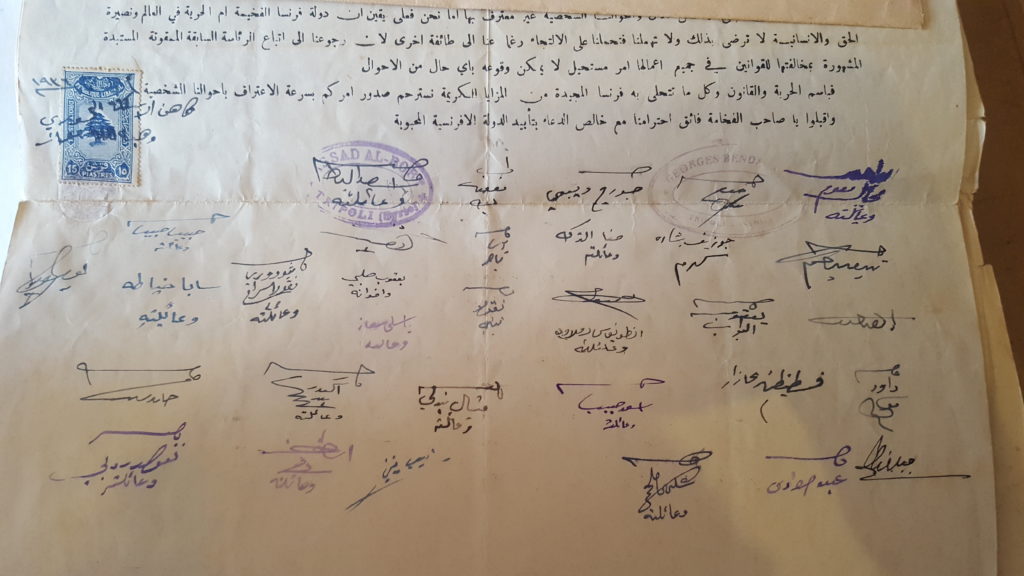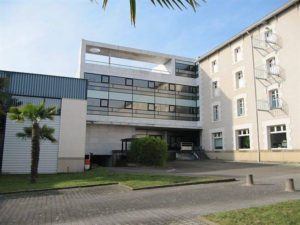The Centre des Archives Diplomatiques de Nantes (the Diplomatic Archives Center in Nantes or CADN) houses extensive collections of French diplomatic files from the 18th-20th centuries. Among scholars of the Modern Middle East, Nantes is most famous for its collections of documents produced by the French mandate in Syria and Lebanon, as well as the French Protectorates in Tunisia and Morocco. However, Nantes also contains thousands of boxes of French consular files from cities around the world. Additionally, the archive has files from several international organizations that France was involved in. Taken together, the CADN is an indispensable stop for anyone working on the Middle East or North Africa in the 19th or 20th centuries.

History
Originally, archives of the French Foreign Ministry were housed in the Quai d’Orsay in Paris. In the 1960s and 1970s, some documents were sent to Nantes for safekeeping – including civil files on French citizens born abroad and files from the High Commission in Syria and Lebanon discovered in Beirut after World War II. As France’s diplomatic archives outgrew the Quai d’Orsay, the French foreign ministry decided to split the ministry archives in two, sending thousands of additional boxes to Nantes. Nantes came to house files produced or retained abroad in consulates, embassies, and by the high commissions in French mandates and protectorates. Quai D’Orsay retained files produced by the Foreign Ministry in Paris. The Centre des Archives Diplomatiques de Nantes was opened to the public in 1987 after extensive cataloguing and organization.
Collection
Les Centre des Archive Diplomatique de Nantes contains approximately 45 km of archival materials. Some of the collection has been preserved on microfilm. There are also a few shelves containing bound volumes on a variety of subjects pertaining to French diplomacy. However, the bulk of the collection can be found in boxes and folders, which contain a wide assortment of newspapers, official publications, reports, correspondence, maps, occasional photographs, and other documents. Some of the boxes have been organized thematically – others are organized by date.
Collections generally fall into one of three categories. The first is files produced by the French government in conjunction with its participation in international organizations. The second is files produced by High Commissions in French protectorates. This includes a wealth of information, such as intelligence reports, diplomatic cables, internal memos, and other files related to the administration of French mandates and protectorates in the Middle East. The subject matter contained in these files is rich and voluminous. Unfortunately, these collections are limited to the years that the French mandates and protectorates operated – for example, the Syria/Lebanon files only cover the period from 1920 to 1946. The final category of collections is consular files, or documents produced and preserved by French embassies and consulates around the world. The scope and temporal range of these files ranges widely by city, but these files often include documents on immigration and emigration, intelligence reports, press reports, data on trade, and diplomatic cables sent out and received by French embassies and consulates. These files are particularly useful for scholars who work on areas of the Middle East that did not fall under direct French control (such as Iraq, Palestine, Egypt, or Turkey).
The Research Experience
Because the archives are maintained by the French government, visitors must go through security before entering. The process seems very formal, but it is straightforward, and the security personnel are kind and professional to all visitors, regardless of nationality. Upon arriving at the building, press the call button at the gate. You will be buzzed in to a room where you will be asked to place any bags through an x-ray machine (similar to machines at airports). Then you will proceed to an outdoor area to sign in. Here you must give the guard your passport, which they hold on to until you leave the center. In exchange, you will receive a badge that grants you access to the main building. Before entering, the guard will come around with a security wand.

Upon entering the building, place any bags, food, or water in one of the lockers near the entrance. You may take laptops, dictionaries, notebooks, chargers, and pencils into the salle de lecteur. Compared to the Foreign Ministry archives in Paris, the archives in Nantes are much less crowded. On a typical summer day, one will typically find around a dozen researchers working at a time, allowing plenty of space to spread out and quick service at the circulation desk. The stacks are closed to researchers, but you can freely browse the archive’s extensive finding aids to assist you in locating materials. It is worth mentioning that all finding aids and most of the materials here are in French. Most of the archivists know some English, but as a general rule, Nantes is slightly less anglophone than Paris. Unfortunately, these finding aids are only available onsite. However, if you are interested in a specific finding aid, the librarians may be willing to send it to you via email. To order materials onsite, go to one of the computers in the salle de lecteur and order (commander) materials through the intranet catalogue system. Log in with your free carte de lecteur number and password, enter the code for the desired material, and then confirm (confirmer) your selection. At Nantes, researchers can order up to 7 boxes per day and can have an accumulated total of 14 boxes available to them at a time. A research can hold (prolonger) each item for up to 15 days.
Unfortunately, you cannot usually view materials the same day. Items ordered before 1pm will be available the following morning at 9am. Items ordered before 4:15pm will be available the following afternoon (though in my experience, these materials are usually available a little before noon). On your first day, I recommend finding a few boxes that you would like to see and putting in an order before 1pm. Then you can spend the rest of the day combing through the hundreds of binders of finding aids and amass a list of materials to order on future days.
Once you have some boxes waiting for you, pick a seat (equipped with a small light and an outlet), then ask the archivist on-duty for one of your items. All you need is your carte de lecteur and the code of the box you want to see. Once you’re finished, return the item to the archivist, let them know whether you are finished (c’est finit) or would like to keep the box in your cache of items (prolonger). Then you are free to ask for the next item. At the end of the day, return all materials to the desk. If you have a laptop, you will usually be asked to bring that up and show that you’re not smuggling out any documents. Then the archivist will give you a little piece of paper that you will need to present to the security guard upon leaving – an “exit visa,” so to speak.
Access
The archives are open to the public, but the stacks are not. To order documents, you must register for a carte de lecteur at the front desk by filling out a short form. Registration is free of charge and the card is generally valid for one year. It also works at the Centre des Archives Diplomatiques de La Courneuve in Paris. As mentioned above, visitors must still bring their passport each day in order to gain entry.
For most of the year, the archives are open Monday through Friday, 9 AM to 6 PM. In July and August, the archives are open Monday through Friday, 9 AM to 5 PM. The archives are wheelchair accessible.
Note: Many files pertaining to Syria and Lebanon will be inaccessible until 2019. Researchers planning a trip to Nantes should reach out to the archivists beforehand to ensure that at least some of the desired materials are available.
Reproduction
Researchers can photograph archival documents freely and without limit.
Transportation and Food
The archive is located East of the city center and North of the Ile de Nantes. Nantes is a relatively small city – certainly compared to London, Paris, New York, or Istanbul. Researchers are likely to find several rooms available within walking distance of the archives through AirBnB or similar sites.
Should you wish to stay further out and would rather not walk, there are a few convenient ways to get to the archive:
Tram: Nantes has a small public tram system that runs through the city. To get to the archive, take the 1 line to the Moutonnerie stop. Then walk Northeast on the Boulevard Ernest Dalby, turn left onto Rue de la Peite Mitrie, then right onto Rue de Casterneau. Alternatively, you could take the 1 line to the Boulevard de Doulon stop, walk Northwest on the Boulevard de Doulon, then turn left onto Rue de Casterneau.
Bus: From the North, you can take bus number 10 and stop at Noe Lambert. From the East or West, you can take either bus number 11 (stop at Casterneau) or bus number 12 (stop at Dalby or Mitrie).
Taxi/Uber: This is by far the most expensive option. Taxis can be difficult to find unless you call in advance. However, Uber works reliably throughout the city.
Food and water is not permitted in the reading room. There is no cafeteria in the building, but there is a break room with vending machines that offer light snacks and beverages. Given the security, it is generally easier to bring food with you. Researchers who do typically eat their lunch in the breakroom or on benches outside (weather permitting). There are several boulangeries and grocery stores nearby where you can pick up something for lunch.
Contact Information
17 rue de Casterneau, 44000 Nantes [primary school]
archives.cadn@diplomatie.gouv.fr
Joshua Donovan is a PhD candidate in Columbia University’s Department of History. His research centers around the social and political history of identity in modern Syria, Lebanon, and its diaspora, before, during, and after the French Mandate.
